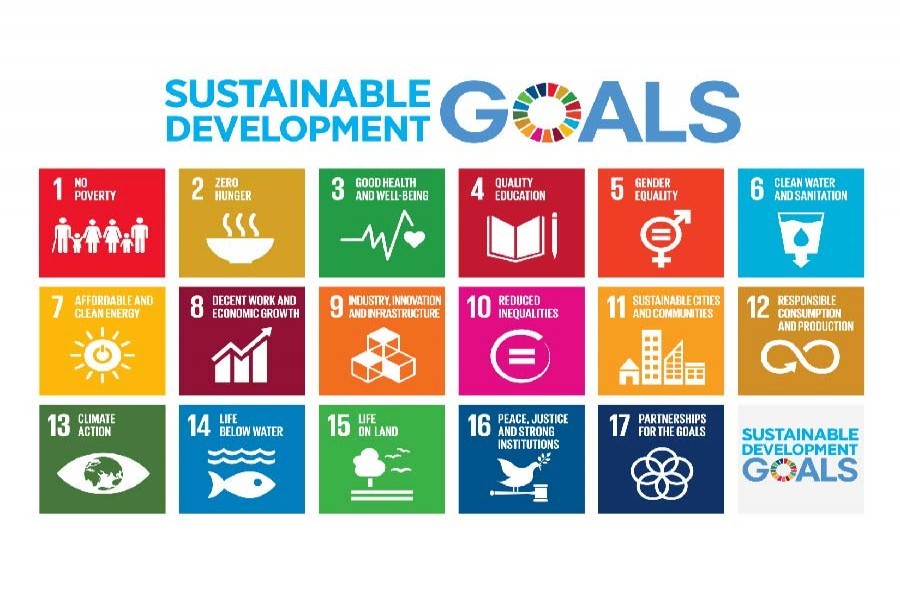The need for a South Asian framework aimed at bolstering cooperation and collaboration among nations in the region for achieving the sustainable development goals (SDGs) has been voiced at a meeting on research policy held in the city. For Bangladesh, achieving millennium development goals (MDGs) unilaterally was possible but SDGs are an altogether different proposition. Regional cooperation under a framework can not only facilitate the process but also expedite it. What, though, remained unsaid is that even if the SDGs are achieved somehow, which is quite challenging, it would be more challenging to maintain the sustainability of development without augmenting economic cooperation between and among neighbours. The challenge is more than ever before because of the ongoing global trade war. So, a suggestion comes straightway for the formation of a regional fund to be devoted entirely to achieving SDGs for all the countries in the region.
How greater regional cooperation can deliver a shot in the arm of member countries is realised from the present level of their inter-regional trade and commerce. Of the total international trade transactions, only 5.0 per cent accounts for the volume between and among them. Clearly, the South Asian Association for Regional Cooperation (SAARC) and its trade instrument South Asian Free Trade Area (SAFTA) have done no justice to their names over the decades. There is hardly any prospect either of their revival in sight. No doubt, the low level of trade can be raised to a reasonably higher trajectory if the neighbours are serious. Of course political will matter here. True, the largest two countries in the region or sub-region are not in the best of terms, politically speaking. It has acted as a damper all through. But it is time that they realised the new realities of the shockwaves of the trade war between the United States of America and China.
In this context, the share of South Asia's export in the global total may shed some light on the issue. With merely 4.07 per cent share, where India is a major player, the rest cut a sorry figure. Excluding India's share, it comes down to only 0.79 per cent, according to the United Nations Conference on Trade and Development (UNCTAD). This speaks volumes for the performance of the rest of the countries in South Asia. Even India's share could rise if the region's performance improved through greater economic cooperation among them. To raise the overall export share of the countries of the region, their capacity building is a must. Now this depends on how they advance their causes by helping each other in developing their inter- and intra-regional infrastructure, communication and areas of investment.
Again, the governments alone cannot accomplish the job. Both public and private sectors need to come forward for undertaking the collaborative ventures. Big private entrepreneurs have money and there is every reason why they should join hands with government agencies. Different regions of the world have felt the urgency of not only economic cooperation but also of scientific and technological collaboration in order to keep their laboratories running and companies and firms afloat. Without international or regional cooperation space exploration has now become nearly impossible. The European Union, notwithstanding Brexit, has cooperated in the mega project CERN -the European organisation for nuclear research -which is an abbreviation of French Conseil Europeen pour la Recherche Nucleaire. Scientists from as many as 100 countries and 680 institutions are involved with it and under a project of the Large Hadron Collider 10,000 scientists worked in order to successfully discover the Higgs Boson particle.
It is for the first time that so many countries have worked together for such a fundamental research project. Such cooperation should be an eye opener for political leaders who squabble over petty matters and differences. Where collective well-being is mostly guaranteed, countries should keep aside political differences in order to expedite economic, commercial, scientific and technological cooperation. The countries of the region have the added responsibility of turning the development initiatives inclusive rather than exclusive. If inclusive, both production and consumption take off to the effect that the standard of life also goes up. If a large number of people remain less productive or unproductive, the overall economy is bound to suffer.
The theme of the SDGs is exactly this where no one is left far too behind to languish in extreme poverty, ill health and wretched condition of living. With the global warming posing a threat to the aspiration of millions of people for a decent life, the challenge becomes even greater. Without regional and global cooperation, particularly in the areas of energy generation, the living standard of many cannot be retained let alone be raised. Along with economic and trade cooperation, therefore, there is need for scientific and technological joint research to find a solution to the energy crisis. Nuclear energy is an option but there is no cent per cent guarantee for its safety. Better it would be to harness the limitless solar energy. If the countries can make a real breakthrough in capturing at a low cost this huge source of energy or any other renewable energy through collaborative ventures, the task of changing life of the backward segments of people for the better will be quite possible.


